It gets better … and sometimes that’s even true
Maybe quantity versus quality is a false dichotomy after all
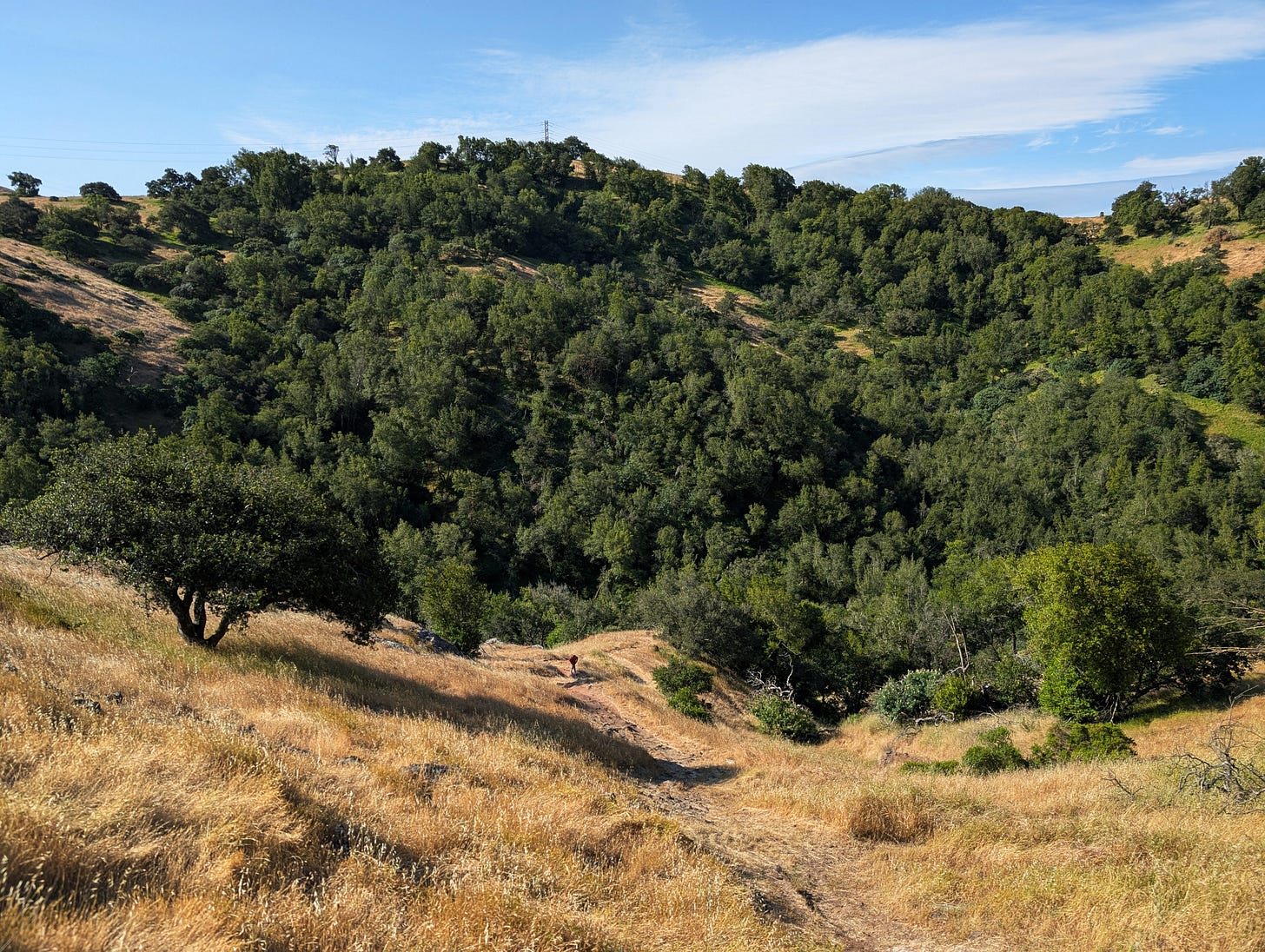
I spent far too much of my 40-mile trail race last weekend being Big Mad — nearly half of it, which I regret. But I started on the wrong foot, so to speak. A small stumble and roll of my ankle on a paved campground road crushed my confidence before I’d even passed the quarter-mile mark.
The tiny field of 11 competitors surged ahead as we hit the trail, a ribbon of sunbaked clay that rippled over sandstone outcroppings. The rock resembled petrified piles of scrambled eggs, and soon my mind was similarly scrambled. I caught my toe, slowed my pace, twisted a knee, and slowed some more. The field swept beside me on the first out-and-back, including Beat, who at mile two was already nearly a mile in front of me. Not only that, but he was chatting amicably with a gorgeous and fiercely fast-looking middle-aged Asian woman. And it’s funny, because although I’m not an untrusting spouse and I’m thrilled when my husband makes new friends of any gender, I’d be denying my humanness if I didn’t admit to a zing of jealousy.
“Do better,” I chided myself as I buzzed the aid station and turned around without taking any snacks. But the obstacles on the trail still felt insurmountable. My brain was scrambled. My so-called tires were badly out of balance. My confidence was in shambles. There’d be no pulling back from this. I’d either walk this entire race, which I didn’t have time to do within the cutoffs, or I’d DNF in disgrace with bloody legs or a broken wrist or a running-career-ending injury like torn knee ligaments, many of which have been torn before and probably can’t weather another rupture.
Here comes the self-loathing. As an Enneagram 6, single-mindedly focusing on flaws so I can “fix” them is sadly a core tenet of my personality. I’ve worked so hard to block negative self-talk from many of my life endeavors. But when it comes to a predominantly enjoyable activity that I do purely as a hobby, I tend to indulge without restraint.
“You’ve been doing this for 15 years and you’re still awful, you’re a flailing rhinosaurus on roller skates, just plant your face in that rock and get it over with, you deserve to be injured for months, you broke-ass, clumsy garbage runner.”
Just as I was on the cusp of indulging in out-loud berating after catching a toe on yet another rock, I encountered the last 40-mile runner on the course — a cheerful 30-something man in a button-down hiking shirt and baggy black shorts. He flashed a broad grin, and I said hello in return. But my Mean Voice was still turned on, and silently I reassured myself with petty thoughts: “At least I’m not last.”
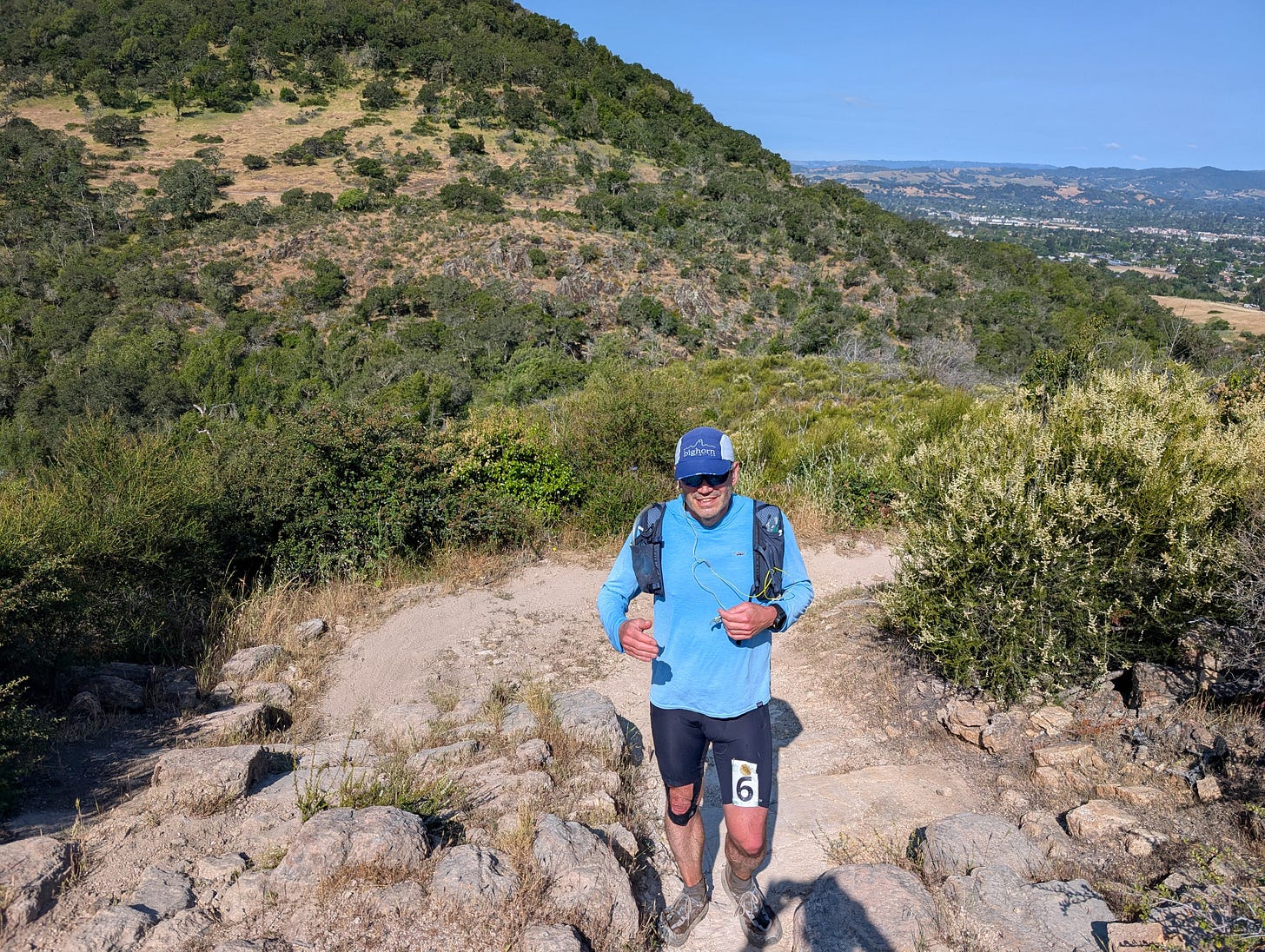
With this thought, I laughed at loud. Who cares if I’m not last? Nobody. I thought about my friend Eric in Alaska, who proudly collects DFLs and uses the much-kinder term that Alaskans use to describe a competitor who has battled the longest to reach the finish, “red lantern.” And I thought about my friend Missy, who is one of the toughest endurance athletes I know, and who recently told me, “I don’t think I’ll race again. Racing does weird things to your brain.”
And yes! That’s exactly it. One week earlier, I embarked on a long run on rocky trails near my home in Colorado and had a fantastic time. Put me in the same situation, but stamp it with a “race” label, and suddenly I become a sullen, pouty child. I’ve been wrestling with the dilemma of racing for years: I like a challenge, I thrive on parameters, and I appreciate the natural camaraderie — after all, I was feeling all the warm fuzzies for hiking shirt guy and believed we were in this mess together. But competition also makes me mean, mostly to myself, and I’m prone to making too many bad decisions in the name of “being better.” If I sign up for a race, I have to make it “count.”
It’s not just racing; quantification has infiltrated every part of our lives: Most adults can’t even play outdoors without calling it a workout and logging it ceaselessly (raises hand). Then there are our reading challenges, sleep tracking, macro counting, travel checklists, gratitude journals, meditation goals, decluttering mandates, productivity optimisation practices, and on and on. It’s all just metastasized capitalism, and we’re so entrenched that we believe nothing has value unless it can be measured and scored.
And yet, deep down, we know what relentless quantification earns us: Stress and sadness. That’s it. We could count forever because there’s nowhere for the tally to end; dissatisfaction is infinite. We know that the fleeting feathers of happiness only arrive on the wind. But we still convince ourselves we can create the wind if only we blow hard enough.
I continued to struggle through the loose, stony soil of the park’s surprisingly primitive-seeming trails. I participated in dozens of trail races across the Bay Area when I lived here, and cling to my ideal that all Bay Area trails are buffed-out cruiser trails on loamy feather-cloud soil, packed sand, or hard clay. Of course, that’s not the case, especially on the inland hills. But I suppose I was thinking, “Napa Valley. Grapes. Good dirt,” not “acres of hot, dry slopes, punchy climbs, poor soil and scrubland.”
I realized I was fixating on rocks and soil because I was looking for something to blame for my poor performance. Truthfully, I wasn’t well-conditioned for a confident performance on any sort of trail race. I spent the winter mostly running on gravel roads or packed snow to prepare for my 100-mile race on snowmobile trails in Alaska. Then I was injured and didn’t run for weeks, only restarting just a couple of weeks earlier, so what did I expect?
With this story in mind, I was ready to be kinder to myself. I knew the negative self-talk would only make my brain a miserable companion to spend 32 more miles with, unless I crashed out of the race earlier, which I was shamefully starting to hope happened. The rockiness continued. I saw Beat at mile 8 and made some calculations from my watch.
“You’re really far ahead of me,” I wheezed. It looked like more than three miles. At this rate, he’d finish in the eight-hour range. I’d be lucky to make the 11-hour cutoff. But he’d lost his race companion. He said he’d pushed himself to keep up with her. It was too much; he’d gone out too hard and had regret. I admit the jealous part of my brain, Mean Voice, served up a smug “serves you right” sense of satisfaction that propelled me up the hill. But then I felt awful about my inner mean streak. What’s wrong with me?
Another hellfire of a “Red Rock” climb, another long and techy descent, and I was finally starting to wear out that mean streak. My scrambled brain could no longer focus well enough to draw its infuriating puzzles or fret about inadequacies. I was able to run on feel. This was such a relief. Like happiness, “intuitive motion” is also something that only arrives in fleeting, unpredictable moments, usually facilitated by a lot of fatigue.
It took until the halfway point, just under five hours, to finally “start” my run. I arrived at the finish line, mile 20, on a stiff wind that had been tearing through the grass and taking the edge of the searing May heat. A gust picked up a half dozen hats from the table and sent them tumbling across the campground. I chased the hats down with quick, cat-like movements and returned them triumphantly to the checker.
“She’s a 40-mile racer,” the woman said with an embarrassing tone of reverence when a man who had just finished a shorter distance congratulated me.
“Wow,” he said, “I could never.”
“Oh, it’s nothing, seriously,” I replied, feeling self-conscious and embarrassed. Mean Voice tried to muscle to the surface to tell my audience what a bad runner I was, how it was beyond amazing I was still on my two feet, how I was slow and near the back of the race. But Mean Voice could f*** right off. I lifted my chin and puffed out my chest a little as I looked directly at the man. “It was fun, right?” I continued. “And I get to do it all over again.”
The second half went so much better. I stated — out loud to counter Mean Voice — that my only goal was to keep the rubber side down and not crash out of this thing. But I was moving more efficiently, with lighter steps, less toe-catching, and a slightly faster pace despite the considerable muscle fatigue. Based on our meeting points, I was no longer losing ground on Beat, yet I no longer felt that mean competition with him and his fast friend. He was having trouble eating and drinking in the heat, and I felt genuine disappointment that he wasn’t going to grab the eight-hour finish that he deserved.
The heat hadn’t been a problem for me. I was wearing my shade shirt, which soaks up sweat and becomes a cooling screen. It was a veritable swamp cooler as the hard wind picked up strength during the day. I’d been generously filling my two-liter water bladder every chance I got — there was not just one but two particularly tough 10-mile stretches between aid stations. I’d kept on top of the electrolyte tablets and chased them with Fruit Jellies from Trader Joes. I’d been doing well with the self-care, and I hadn’t fallen on my face! So actually, this race was going great for me. I don’t know what Mean Voice’s deal even was.
I still hoped for that sub-ten-hour finish, but risked nothing and eventually came in at 10:11. The checker whose hats I’d saved walked up to give me my finish swag — a glass wine tumbler, a trucker hat, and a special drawstring bag that they were only giving to the first- and last-place finishers. So I was last.
“But what about that guy, there was a guy behind me,” I stammered, thinking of hiking shirt guy. I hadn’t seen him since the devilish first Red Rock climb. I admit I hoped I’d put some ground on him. But maybe he passed me.
The woman showed me a handwritten list with four or five names. “No, I’ve accounted for everyone. You were the last 40-miler out.”
I looked down at my bag. “You know what,” I proclaimed loudly, “I can be DFL, it’s fine.”
Beat’s new girlfriend (I kid, I kid) walked up, gave me an enthusiastic shoulder shake, and said, “You did great!” She’d finished a full two hours earlier, a 53-year-old with children in their 30s, and she had only recently switched from road running to trails. I learned all of this from Beat later. She was so much cooler than I, but the point was she’d finished two hours earlier, she was still hanging out at the nearly deserted finish line even though the coolers of drinks and burritos had long been emptied, and she made an effort to be supportive.
You know what? I love this sport.
Clearly I have some work to do on myself. And by that I mean build up my mind muscle and learn acceptance and humility (Self-deprecation, of which I possess an abundance, is just inverted egotism. Humility comes from a different place entirely.) But I do love racing. In my regular outings, such a terrible first 20 miles would have resulted in quitting in frustration at the first chance I got. But that sometimes-misguided competitive streak encourages me to stick with the shit I signed up for. Often, what I find on the other side is incredible.




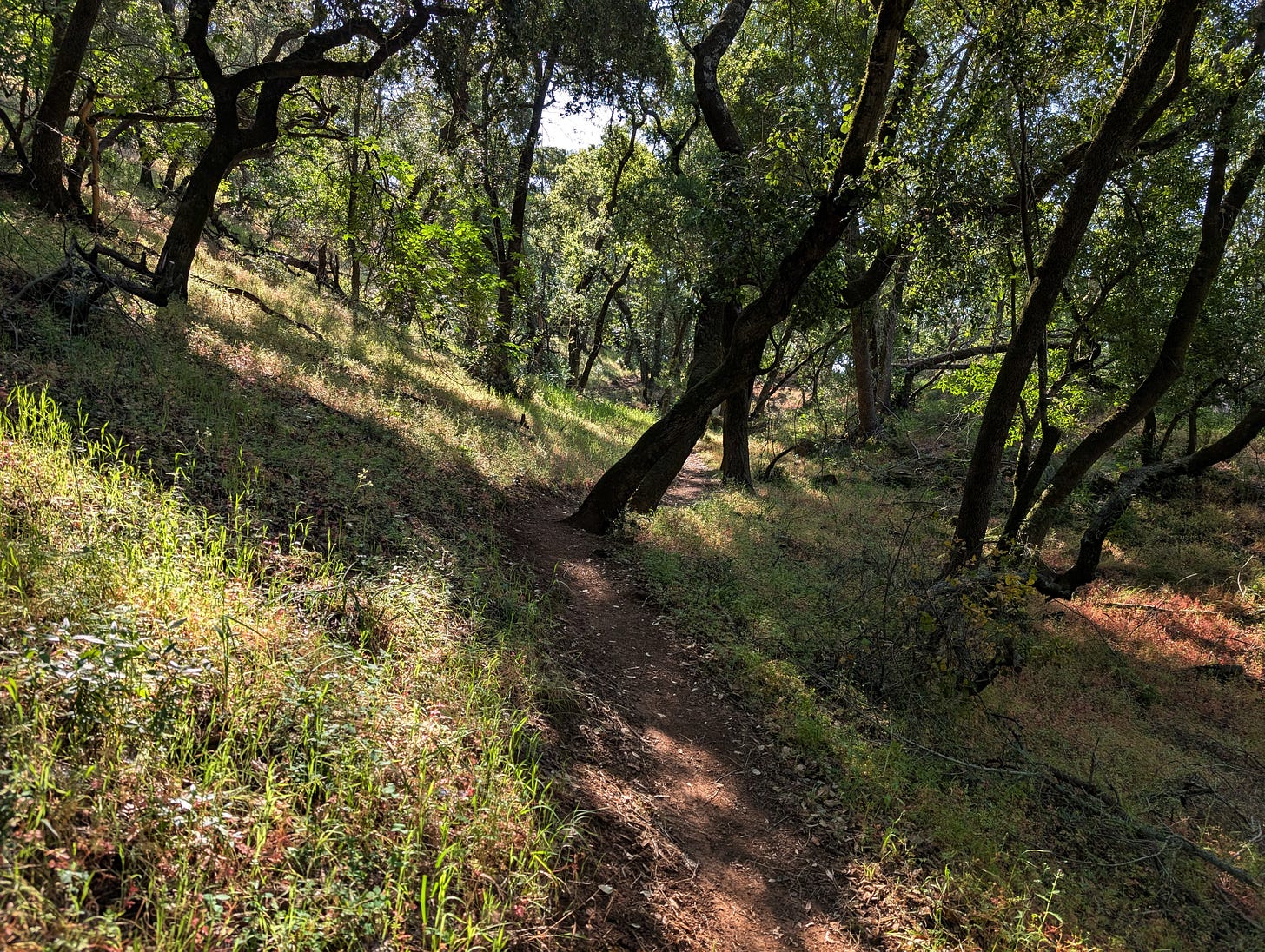
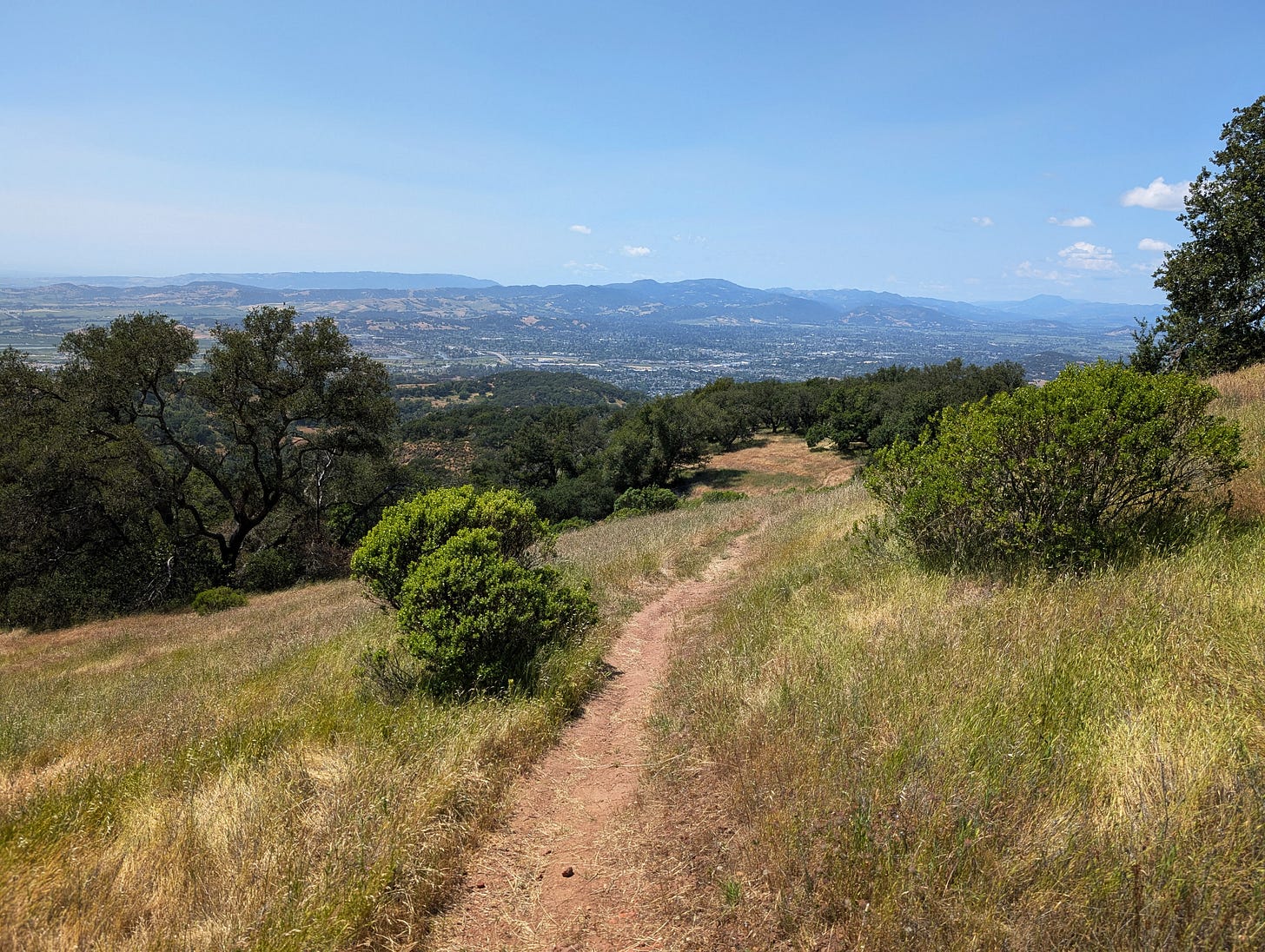
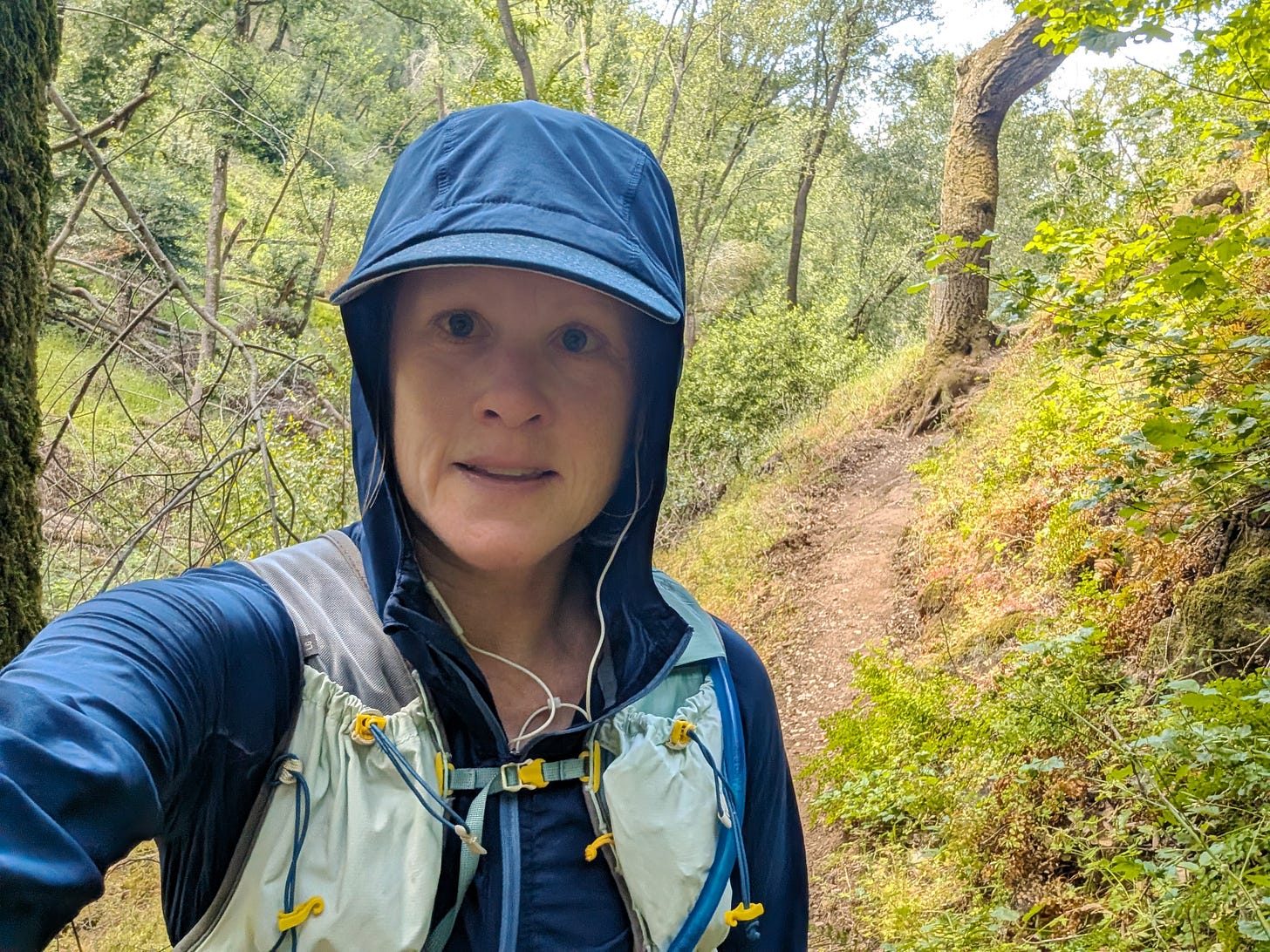
DFL. It's a Britishism. Did Fine, Love.
I do love your rhinosaurus! Got me picturing wild beasts!